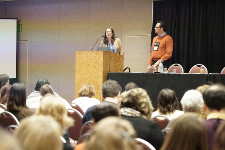
Student petitions for policy exceptions may leave a registrar dealing with gray areas -- not something registrars are known to enjoy.
“Kant, the deontologist, said you must do what is ‘right’ no matter the consequences,” said Michael Santarosa, Registrar at Westminster College in Salt Lake City, at his Monday morning Annual Meeting presentation in Minneapolis. “This is where registrars like to act most of the time.”
The packed room laughed knowingly; indeed, registrars have a reputation as being sticklers for rules.
“Would I want everyone else to make this decision? Could it be a universal law?” Santarosa said. If not, the deontologist would say, then you must not make the decision.
Choosing an ethical paradigm
Deontology is just one ethical paradigm, and it’s not without pitfalls. In deontology, the principle dictates the action, regardless of the consequence. In another familiar paradigm -- utilitarianism -- the focus is on the action and its consequence (the greatest good for the greatest number), but fails to consider the guiding principle or intent.
Virtue (or teleological or Aristotelian) ethics attempts a more holistic reckoning, and that’s where the gray area comes in. Teleology is a longer-term project aimed at cultivating wisdom and a habit of virtue, but it can become bogged down in relativism. Santarosa covered these approaches in a previous Connect article, which prompted his co-presenter Margo Landy, Registrar at the University of the Pacific, to get in touch with him, and became the impetus for this session.
Understanding the role of bias
Awareness of these ethical paradigms is more than an academic matter. It can help make explicit the decision-making process. How do you justify making exceptions? How do you train those on the review committee? The policy itself may have parameters for permitting exceptions. There may be precedent to consider. However, each case has its own quirks, and each student is unique.
An essential part of ensuring fairness is to be aware of the significant role bias plays in our decision making, and to reduce the influence of bias as much as possible.
Landy, a philosophy-student-turned-registrar, noted that philosophers have great faith in the power of the human mind.
“However, since I’ve left philosophy, research from social science has challenged my belief in the primacy of human reason,” Landy said, “because we’re biased.”
“Our cognitive limitations as humans undermine our ability to make judgments,” she said. “It’s a normal cognitive strategy of categorization.” But it can have devastating, unintended consequences.
For example, race and gender bias affect hiring, mentorship, academic performance, and perceptions of “brilliance,” according to research Landy cited. And though there’s no research yet on bias in applying or enforcing policies and exceptions in higher education, it's reasonable to assume these biases affect those decisions as well.
“How could bias affect our judgment when making exceptions?” Landy asked. “At the most basic, if you are biased against a group, then you cannot be expected to balance individual situations fairly. And when the bias is unconscious, it’s difficult to see it in play.”
Training and bias literacy are important first steps to promoting a fair process, Landy and Santarosa concluded. The Implicit Association Test [IAT] is an excellent place to start.
“The results [of the IAT] can be troubling yet illuminative,” Landy said. “And awareness of bias and understanding of types of bias and how they are manifested can actually be effective in minimizing the impact of bias.”
Review the session Powerpoint here.